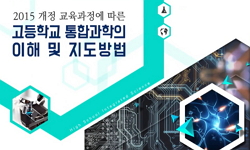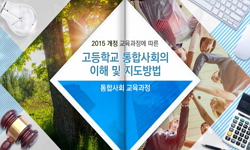이 연구는 초등학교 교과 교육과정 개발과 관련하여 기존의 총론에서 제시하였던 교육과정 통합방식을 비판적으로 검토하고, 새로운 방향을 탐색하고자 한 것이다. 우리나라 초등학교 교육...
http://chineseinput.net/에서 pinyin(병음)방식으로 중국어를 변환할 수 있습니다.
변환된 중국어를 복사하여 사용하시면 됩니다.
- 中文 을 입력하시려면 zhongwen을 입력하시고 space를누르시면됩니다.
- 北京 을 입력하시려면 beijing을 입력하시고 space를 누르시면 됩니다.

초등학교 교과 교육과정의 통합 방식 연구 : 총론 개발을 위한 시사점 탐색 = A study on the approaches to the integrated curriculum of elementary school-Focusing on the development of introduction
한글로보기https://www.riss.kr/link?id=A105091850
- 저자
- 발행기관
- 학술지명
- 권호사항
-
발행연도
2007
-
작성언어
-
- 주제어
-
KDC
373
-
등재정보
KCI등재후보
-
자료형태
학술저널
-
수록면
63-88(26쪽)
-
KCI 피인용횟수
27
- 제공처
-
0
상세조회 -
0
다운로드
부가정보
국문 초록 (Abstract)
이 연구는 초등학교 교과 교육과정 개발과 관련하여 기존의 총론에서 제시하였던 교육과정 통합방식을 비판적으로 검토하고, 새로운 방향을 탐색하고자 한 것이다. 우리나라 초등학교 교육과정에 통합 교육과정이 나타난 것은 4차 교육과정 때부터이지만, 통합 개념이나 방식에서 아직 통일된 견해가 정착되어 있지 않은 실정이다. 이에 그동안의 통합 교육과정 관점과 실태를 살펴보고, 앞으로의 개선 방향을 제시하였다. 우리나라 통합 교육과정에서 볼 수 있는 특징과 시사점을 다음과 같이 요약 할 수 있다. 첫째, 교육과정 통합의 의미가 불분명하며, 그 방식도 확고하지 않다. 교과 간 통합으로부터 활동 주제 통합으로 이행되고 있으나 기본 방식은 여전히 교과 간 통합을 완전히 벗어나지 못하고 있다. 둘째, ‘우리들은 1학년’ 교과만 오로지 내용 통합을 전제로 한 탈 교과 성격을 띠고 있다. 셋째, 각 교육과정 시기별 통합 방식이, 교과에 따라 서로 다르기보다, 모든 교과에서 동일하다. 넷째, 통합 교육과정의 적용 대상이 아직 1, 2학년에 한정되어 있다. 다섯째, 통합 정도가 부분 통합이 지배적이며, 7차 교육과정에 이르러 부분적으로 완전 통합으로 이행하고 있다. 여섯째, 통합 교육과정의 개발 주체가 여전히 국가이다. 이러한 점에 비추어 볼 때 앞으로의 통합 교육과정 개발에서는 다음과 같은 사항을 진지하게 고려하여야 할 것이다. 첫째, 교육과정 통합의 의미와 관점 및 준거 등을 명백하게 하여야 할 것이다. 둘째, 교육과정 통합 방식을 교과의 성격에 따라 다양하게 하여야 할 것이다. 셋째, 교육과정 통합의 대상을 1, 2학년 이상으로 확대 적용하여야 할 것이다. 넷째, 통합 교육과정 개발 주체를 국가 일변도에서 벗어나 교사들이 적극 참여하는 다원화 정책이 필요하다. 다섯째, 통합 교육과정을 효과적으로 실천하기 위한 교사 연수를 지속적이며 체계적으로 실행할 필요가 있다. 교육과정 통합에 관한 올바른 이해와 실천을 도울 수 있는 연수를 강화하여야 할 것이다.
다국어 초록 (Multilingual Abstract)
Integrated curriculum has been a topic of discussion in the field of curriculum study and the development of national curriculum since the early \ 80s in Korea. It was seen at the 4th national curriculum period for the first time, and lasted 7th natio...
Integrated curriculum has been a topic of discussion in the field of curriculum study and the development of national curriculum since the early \ 80s in Korea. It was seen at the 4th national curriculum period for the first time, and lasted 7th national curriculum period at the elementary school level. Nevertheless the concept of integrated curriculum and the implementation has been possessed by the integration of the subject. These are still remained key tasks to solve. The purpose of this article is to identify the task of integrated curriculum at the elementary school and suggest some implications for the future integrated curriculum development. In the light of critical review of the present curriculum documents, some implications are presented as follows. First, there are no agreements on the definitions of integrated curriculum. The meanings, references and viewpoints of integrated curriculum should be identified more clearly. If the meaning of integration defined plainly, the traits and approaches of integrated curriculum shall be more distinct. Second, the approaches to integration of curriculum should be diverse with relations to the traits of different subjects. Third, it will be considered the objects of integration are extended from 1st or 2nd grade to the above grade. We will have to take into account the desires which much integration of upper class curriculum. Fourth, The main body of development of integrated curriculum is nation in Korea. Teachers have been removed from developing curriculum. More teachers take part in an activity curriculum development at the primary school level in the future. Finally, there will be more need systematic in-service education about integrated curriculum for the teachers\ right understanding and effective implementation. It seems that intensified in-service education is one of the fatal factor of successive implementation of integrated curriculum.
목차 (Table of Contents)
- Ⅰ. 서론
- Ⅱ. 교육과정 통합 방식의 다양성
- Ⅲ. 초등학교 교육과정 통합 실태에 따른 주요 문제 검토
- Ⅳ. 결론 및 시사점
- 참고문헌
- Ⅰ. 서론
- Ⅱ. 교육과정 통합 방식의 다양성
- Ⅲ. 초등학교 교육과정 통합 실태에 따른 주요 문제 검토
- Ⅳ. 결론 및 시사점
- 참고문헌
참고문헌 (Reference)
1 "통합교육과정의 구성 방식에 관한 일고(一考)" (10) : 61-80, 2005
2 "통합 교육과정의 과제와 전망" (10) : 287-308, 2005
3 "초등학교 통합교과교육론" 서울: 교육과학사 1998
4 "초등학교 교육과정 해설(Ⅱ): 우리들은 1학년, 바른생활, 슬기로운 생 활, 즐거운 생활, 특별 활동" 교육부 1998
5 "초등학교 교사들의 통합교육 운영실태와 그 활성화 방안 학습자중심교과교육연구" (10) : 163-187, 2005
6 "대한교과서사(1948-1998)." 대한교과서주식회사 1998
7 "교육과정 통합과 평 생교육" 서울: 학지사 1995
8 "교육과정 개발: 주요 쟁점 및 새로운 접근" 서울: 교육과학사 2003
9 "Meeting standards through integrated curriculum" Alexandria, V. A: ASCD 2004
10 "M.(1972 7-13."
1 "통합교육과정의 구성 방식에 관한 일고(一考)" (10) : 61-80, 2005
2 "통합 교육과정의 과제와 전망" (10) : 287-308, 2005
3 "초등학교 통합교과교육론" 서울: 교육과학사 1998
4 "초등학교 교육과정 해설(Ⅱ): 우리들은 1학년, 바른생활, 슬기로운 생 활, 즐거운 생활, 특별 활동" 교육부 1998
5 "초등학교 교사들의 통합교육 운영실태와 그 활성화 방안 학습자중심교과교육연구" (10) : 163-187, 2005
6 "대한교과서사(1948-1998)." 대한교과서주식회사 1998
7 "교육과정 통합과 평 생교육" 서울: 학지사 1995
8 "교육과정 개발: 주요 쟁점 및 새로운 접근" 서울: 교육과학사 2003
9 "Meeting standards through integrated curriculum" Alexandria, V. A: ASCD 2004
10 "M.(1972 7-13."
11 "Learning for Living. 12" 8-11, 1973
12 "A collection of philosophical papers. London" 1974
13 ". 통합 교육과정의 개념. 한국교육개발원 편 통합교육과정의 이론과 실제." 1983
14 ". 민주주의와 교육. 서울" Macmillan. 이홍우 역 교육과학사. 19161987
15 ". 교육과정의 통합적 접근. 서울" 교육과학사. 1985
16 ". The process of education. Cambridge" Harvard University Press. 1960
17 ". The logic of education. London" 1970
18 ". Ten ways to integrate curriculum. Educational leadership. 49" 61-65, 1991
19 ". Liberal education and the nature of knowledge. In Peters The philosophy of education. Oxford University Press." 1978
20 ". Integrating subject areas in primary education curriculum UNESCO Regional Office Education in Asia and Pacific." 1982
21 ". Educational theory. In J. W. Tibble. The study of education. London" . 교육학개론. 교육과학사. 19661981
동일학술지(권/호) 다른 논문
-
개정 교육과정에 따른 수학 교과서 개발과 교사의 전문성 개발의 과제
- 학습자중심교과교육학회
- 강명희
- 2007
- KCI등재후보
-
TGT 협동학습이 수학과 문제해결력 및 수학적 태도에 미치는 효과
- 학습자중심교과교육학회
- 박일수
- 2007
- KCI등재후보
-
초등학교 교장의 리더십이 교사의 조직헌신 및 집단응집에 미치는 영향
- 학습자중심교과교육학회
- 권동택
- 2007
- KCI등재후보
-
- 학습자중심교과교육학회
- 김병수
- 2007
- KCI등재후보
분석정보
인용정보 인용지수 설명보기
학술지 이력
| 연월일 | 이력구분 | 이력상세 | 등재구분 |
|---|---|---|---|
| 2027 | 평가예정 | 재인증평가 신청대상 (재인증) | |
| 2021-01-01 | 평가 | 등재학술지 유지 (재인증) |  |
| 2018-01-01 | 평가 | 등재학술지 유지 (등재유지) |  |
| 2015-01-01 | 평가 | 등재학술지 유지 (등재유지) |  |
| 2011-01-01 | 평가 | 등재학술지 유지 (등재유지) |  |
| 2008-01-01 | 평가 | 등재학술지 선정 (등재후보2차) |  |
| 2007-01-01 | 평가 | 등재후보 1차 PASS (등재후보1차) |  |
| 2006-01-06 | 학술지명변경 | 외국어명 : Journal of Learner-Centered Curriculum and Instruction -> The Journal of Learner-Centered Curriculum and Instruction |  |
| 2006-01-01 | 평가 | 등재후보학술지 유지 (등재후보1차) |  |
| 2004-01-01 | 평가 | 등재후보학술지 선정 (신규평가) |  |
학술지 인용정보
| 기준연도 | WOS-KCI 통합IF(2년) | KCIF(2년) | KCIF(3년) |
|---|---|---|---|
| 2016 | 1.29 | 1.29 | 1.31 |
| KCIF(4년) | KCIF(5년) | 중심성지수(3년) | 즉시성지수 |
| 1.37 | 1.42 | 1.436 | 0.33 |




 스콜라
스콜라






